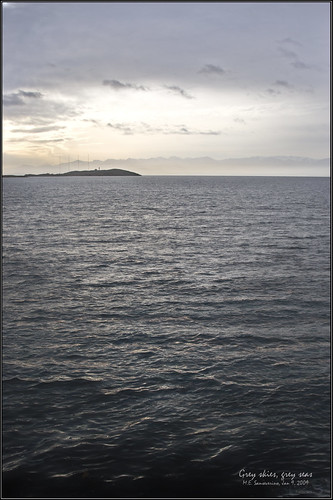So far the month of January has been grey, grey, grey. But, as I recently found out, that is so much better than white, white, white! For several weeks at the end of December we in Victoria had snow and ice. It was not easy to get around. I even fell off my bike riding in the snow. Now the icy white stuff is gone, and for that I am happy, but the grey, just like in this photo, has descended.
This picture was taken on Friday, Jan 9, 2009 a few blocks from my house down at McNeil Bay. The view is across to Trial Island on the left, with the Olympic Mountains of Washington state in the background. There was a bit of clear sky and just a touch of warm golden light available on this otherwise very grey day. You can see the touch of gold on the water and across the mountain backdrop. Hopefully better weather will come our way soon and I'll get off to the surrounding hills for something a bit more cheery!
I used HDR (High Dynamic Range) for this shot. I wanted to pick up the detail in the ocean and keep the ridgeline of the Olympics in view across the back of the photo. HRD involves taking three or more pictures of the same scene, but at different exposures. These exposures are then blended in an application like Photoshop. This technique allows you to capture a wider range of brightness in the scene than can be recorded in one shot by the camera.
For example, in this photo I wanted to keep the detail in the mountains, while at the same time letting viewers catch a glimpse of the light and detail on the wavelets in the foreground. If I took a shot that accurately captured the foreground I would "blow out" the highlights over the mountains -- that part of the photo would just be a blast of white. If I exposed the mountain ridge correctly, the wavelets in the foreground would be almost black. So, like Goldilocks, I took one picture that was too "hot" (over exposed), one that was too cold (underexposed), and one that was just right (according to the camera). Then I blended them in Photoshop.
Our eyes are truly miraculous organs -- we can look at a scene and catch a huge range of light, seeing detail in both shadows and light. The camera just can't do that. I am getting used to seeing a scene in the field and thinking that it might make a good HDR. But the process in Photoshop is still a dark art as far as I'm concerned. It is just lucky when something turns out even a bit. I wonder if this is the case for others who create HDR shots?
Golden morning light
-
M.E. Sanseverino posted a photo:
[image: Golden morning light]
Not, perhaps, the most exciting ocean shot ever - but I liked the light and
wanted to rem...
1 day ago




0 comments:
Post a Comment